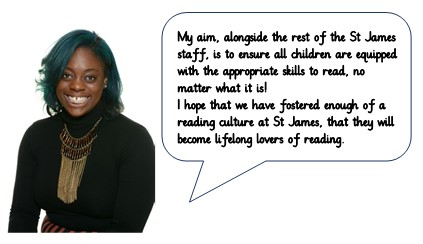
Phonics
Phonics and Early Reading
Instruct the wise, and they will be even wiser.
Teach the righteous, and they will learn even more.
Proverbs 9:9
At St James Church of England Primary School, we aim to give our children the tools to let their lights shine as fluent readers and lovers of literature.
Aims
- To develop phonetic skills which develop fluent and accurate readers
- To give all children word work strategies that will enable them to become fluent readers and confident writers
- To promote confidence and positive attitudes to reading
- To promote reading for pleasure to access a wide range of literature
Phonics is a way of teaching children to read quickly and skillfully. They are taught how to recognise the sounds that each individual letter makes; identify the sounds that different combinations of letters make such as /sh/ or /ee/; and blend these sounds together from left to right to make a word. Children can then use this knowledge to ‘decode’ new words that they hear or see. This is the first important step in learning to read.
Working alongside parents and carers, we want to provide our pupils with the skills they need to have a successful start to their lives as readers and to ensure that our children develop a love of reading.
Systematic Synthetic Phonics
We use the Systematic Synthetic Phonics programme Little Wandle: Letters and Sounds revised, to teach with rigour and fidelity. We teach our phonics, so that is accessible to all, by planning for 100% engagement from each child. Synthetic systematic phonics is a key skill that supports the development of early reading.
The four key concepts the children are taught are:
1. Letters are symbols that represent sounds.
2. Sounds can be spelled using 1, 2, 3 or 4 letters.
3. The same sound can be spelt in different ways.
4. The same spelling can represent different sounds.
The three skills children need to master are:
1. Blending
2. Segmenting
3. Phoneme Manipulation.
Our phonic lessons often follow the revisit/review, teach and practice and practise and apply model. Lessons are planned to include opportunities for the development of speaking and listening and writing, as well as providing pupils with key reading skills such as oral blending and segmenting. The lessons are fast paced and repetitive to ensure the pupils learning is securely embedded. Our pupils are assessed every half term and re-grouped according to their next steps so that they always receive targeted teaching.
Throughout the school, pupils are provided with a range of fiction and non-fiction books which are regularly monitored to secure confident blending but also aid progression within their reading. In the Early Years Foundation Stage and Key Stage One we have supplemented our scheme, with wholly decodable texts from the well-established Ransom Books which corresponds with our chosen Synthetic Systematic Programme. Once fluent, the children move onto the reading scheme from PM Storybooks and use MyOn to aid with home reading.
Phonics Assessment
Each June, all children in Year 1 undertake a National Phonics Screening Check. This check consists of 40 words (20 real words and 20 pseudo words) which all children are asked to read by a familiar adult. The focus of this check is to see if pupils can decode a range of unfamiliar words with the skills that have been taught.



